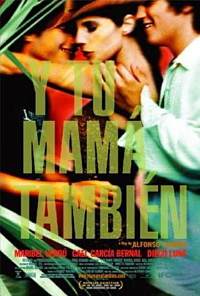 |
 |
 |
 Entertainment | May 2007 Entertainment | May 2007  
Mexican Directors Try to Cut Huge Deal
 El Universal El Universal


| | One of the lower-profile directors is Alfonso Cuarón´s younger brother, Carlos, co-writer of the independent hit "Y Tu Mamá También." |
Hollywood - Three prominent Mexican directors and two lesser-known ones are quietly shopping themselves to Hollywood in an all-or-nothing, five-picture deal.

The price tag: as much as US$100 million.

Merging their talents and newfound clout are Guillermo del Toro, Alfonso Cuarón and Alejandro González Iñárritu, who, in taking this initiative, are seeking the kind of creative control and ownership over their work that few filmmakers enjoy.

Studios are being asked in the unprecedented proposal to bankroll five movies, at least two of which are expected to be in Spanish.

Typically, studios greenlight only one movie at a time.

In addition, not all the movies will be from the threesome behind such acclaimed films as "Pan´s Labyrinth," (del Toro) "Children of Men" (Cuarón) and "Babel," (González Iñárritu), a best-picture Oscar nominee.

One of the lower-profile directors is Alfonso Cuarón´s younger brother, Carlos, co-writer of the independent hit "Y Tu Mamá También," whose planned soccer drama "Rudo y Cursi" is being offered in the package and would mark his feature directing debut.

The other director is Rodrigo García, who made Sony Pictures´ upcoming drama "Passengers" and directed episodes of cable TV shows such as "Six Feet Under" and "Big Love." His father is Nobel Prize-winning novelist Gabriel García Márquez.

Over the past several weeks, the directors´ respective agents have been talking up the "five-pack" proposal to a select group of equity funds and studios where the directors have strong ties, including Universal Pictures, Paramount Vantage and Warner Bros.

As of last weekend, Universal was the front-runner; the other studios had concluded that the asking price was too onerous.

Studio executives and agents involved in the deal, who declined to comment for confidentiality reasons, cautioned that the proposed transaction was complex, with a lot of moving parts that were still being hammered out.

The deal highlights the tight relationship among the three better-known filmmakers, who have been friends for years, often work together and actively promote one another´s movies.

Cuarón and del Toro have produced each other´s films. During this year´s Oscar season, the directors hosted parties and screenings for one another´s nominated films.

Another unusual characteristic of the deal is the temporary alliance of three powerful rival talent agencies, Endeavor, William Morris Agency and Creative Artists Agency, which regularly fight for business and poach one another´s clients. González Iñárritu recently defected from Endeavor to CAA.

The deal was conceived by the directors themselves, rather than their agents, and driven in large part by their focus on the international marketplace.

That philosophy fits well with Universal´s strategy of expanding its business internationally. Typically, foreign markets account for more than half a movie´s theatrical revenue.

One advantage for Universal in making the deal would be its ability to finance a large portion of the movies by preselling the foreign distribution rights through its well-established Focus Features International.

The studio also operates Universal Pictures International, which is ramping up its overseas production and distribution activities.

In addition, Universal would have access to the deep pockets of its parent company, General Electric Co., which owns the major financing entity GE Capital.

Universal has close ties to the three higher-profile directors. Focus Features released González Iñárritu´s second feature, "21 Grams," and Universal financed and distributed Cuarón´s "Children of Men." Next year the studio will release del Toro´s "Hellboy 2: The Golden Army."

For the directors, Universal offers a single place for financing and international distribution of their movies. In the past, Alfonso Cuarón, del Toro and González Iñárritu have struggled to cobble together independent funds from all over the world.

It is unclear whether Universal, which is most interested in the international rights, would have first dibs on releasing the five movies in the United States and Canada.

Two parties involved in the deal said that the directors themselves would determine which studio was the best fit for each movie domestically.

The sources also said that although all five films had been identified and budgets had been estimated, some of the projects didn´t have finished scripts.

Although the total cost of the five-movie package could be as high as US$100 million, the individual films are budgeted at a modest US$10 million to US$40 million. | 
 | |
 |



